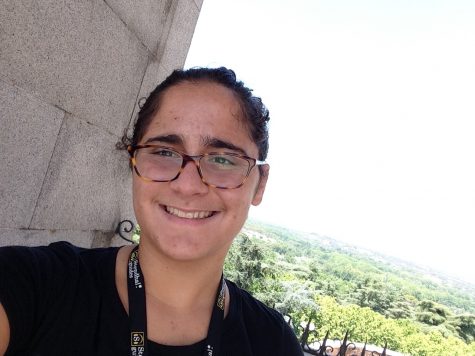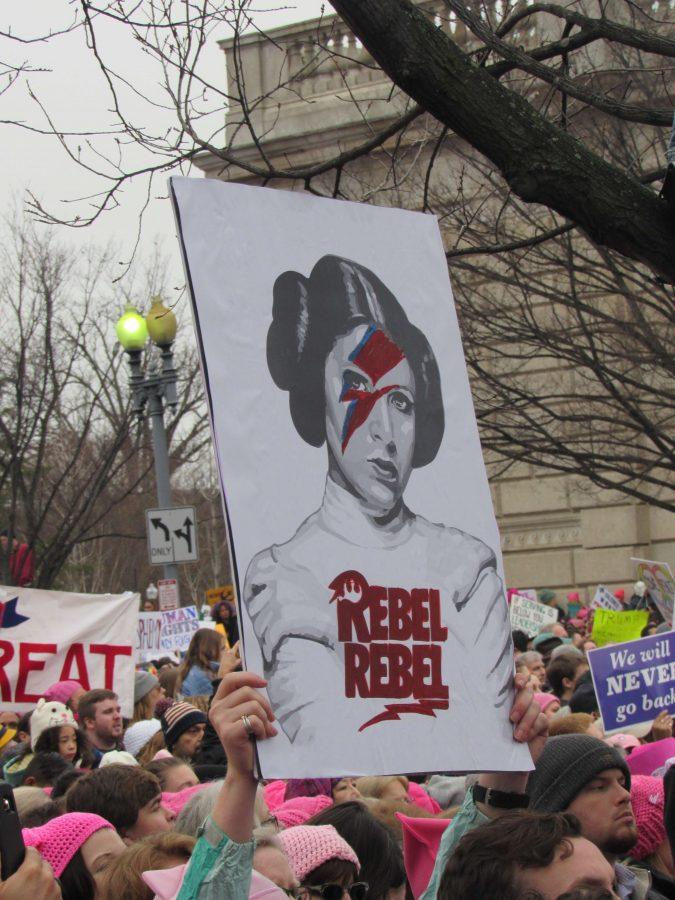Women’s March Editorial: This is What Democracy Looks Like
Carrie Fisher’s legacy as strong-willed Princess Leia was honored at the Women’s March on D.C. in marcher’s signs.
“Show me what democracy looks like!”
“This is what democracy looks like!”
“Show me what democracy looks like!”
“This is what democracy looks like!”
Of all the messages chanted during the Women’s March on Washington, this was the one that rang the loudest and the most often. It is one that I hope will continue to echo in the coming months because it was the chant that personally summed up not only the march on D.C., but also the hundreds of sister marches that took place around the world.
For me, the march was a fitting end to my week at in D.C. with fifteen of my classmates and two great chaperones (shout out to Ms. McCort and Ms. Beck). We went to D.C. as part of “Close Up”’s inauguration program, which focused on increasing political efficacy in the face of the election.
In simple terms, political efficacy is the idea that citizens have the power to understand and influence politics. As seven of my classmates, my fellow marchers, and I took our spot in our country’s democracy, I felt empowered to just that. I felt so proud that I was there and expressing my opinion. For the first time ever, I felt like my words weren’t being lost in a sea of shouts, but becoming part of one giant voice that demanded national attention.
The empowerment I felt during the women’s march was a godsend. The day before, my classmates and I had gone to the inauguration, which had been the focus of the Close Up trip. At the inauguration, even though I would not have voted for this president (I was seventeen during the election), I was proud to watch a peaceful transition of power, the continuation of which Senator Roy Blunt pointed out, quoting Ronald Reagan, is “both commonplace and miraculous– commonplace, every four years since 1789, when President Washington took this exact same oath, miraculous because we’ve done it every four years since 1789”.
Despite the miracle I witnessed, however, the atmosphere at the inauguration, at least where my school was standing, was so nasty that the pride I took in the ceremony was something I had to dig for deep inside. Once found, I had to hold on to it with grim determination. This determination was what allowed me to go through the inauguration without crying. For, during the ceremony, there was incessant booing every time a Democrat even appeared on the jumbotron, at one point the jeers were so loud that Democratic Senator Chuck Schumer’s speech was drowned out. Worst of all, one man standing near us Hitler-saluted President Trump. Earlier that week my group had gone to the Holocaust museum; the horrors of what that salute symbolized were fresh in my mind and I still cannot believe the fact that that man had the gall to do that at the inauguration of the President of the United States. It sickens me that a fellow American would ever think it was right to desecrate the office that for the past century has been seen the beacon of liberty. But, at the end of the day I had to accept that Donald Trump is now our president and, for better or for worse, he is our leader and his successes are our successes.
The march the next day was empowering. But while there were certainly posters and chants aimed at President Trump, the Women’s March was in no way just an “anti-Trump rally”. To classify it as such would be a gross oversimplification of everything the speakers and marchers stood for. Even more importantly, however, and the main difference between Friday and Saturday, was the fact that the march was not feeding off of negative energy as the crowd at the inauguration had done. Instead the women’s march fed off of respect and kindness and inclusion. It was this atmosphere that helped me take hope in the ability to create change without trampling on the rights or opinions of others.
Before we started “marching”–though it was really more of a dedicated shuffle because there were so many people– activists and celebrities spoke about the march’s pivotal issues including LGBTQ rights, religious freedom, immigration, and, of course, women’s rights, and the right to a legal and safe abortion.
Of the many speakers, the one whose speech struck me the most was Scarlett Johansson’s. I agreed completely with her when she said, “President Trump, I did not vote for you. That said, I respect that you are our President-elect and I want to be able to support you. First, I ask that you support me, support my sister, support my mother, support my best friend and all of our girlfriends, support the men and women here today that are anxiously awaiting to see how your next moves may drastically affect their lives.”
I also loved how Johansson talked about Planned Parenthood and the way it has affected her and her friends’ lives. Every friend she talked to shared a memory with Johansson and the one that she used to sum these experiences was her friend’s comment that “[Planned Parenthood] saved my ass and some other parts too”. Before the rally, Planned Parenthood was just an organization to me. Now, I see it as a place where women go when they need help and healthcare; I want to help fight for it all the more because of that.
My favorite speaker of all, however, was brave, little Sophie Cruz, who at six years old had more courage that most adults. The daughter of two undocumented immigrants, Sophie gave a speech –once in English and once in Spanish– in which she asked people to “fight with love and courage” so that families such as hers will not be torn apart. I hope that I can find even a tenth of her strength inside of myself as I fight for what I believe in.
Already, the march and the Close Up trip have changed my life– for one thing, as soon as I got home, I registered to vote. But even as I continue to gain confidence in my ability to help create change, it’s a process that is often one step forward and two steps back, especially when one’s hope to expand rights is met with rudeness or hate. On the flight back to SFO, for example, my group’s cheer in response to a passenger’s cry of “Who marched in D.C.?” resulted in us being called “disgusting bitches” and “baby killers” by the United flight attendants.
But even though I was mad enough to spit, part of the pledge I made to myself at the women’s march was to respect other’s opinions just as much as they disrespect ours. So, when the flight attendants went low, my group and I kept their calm and went high. I’m glad that we had enough strength of character to do that. Because, after all, what are two or three unprofessional flight attendants compared to a group of young women and men who’ve found their voice?
Your donation will support the student journalists of Dublin High School. Your contribution will allow us to purchase equipment and cover our annual website hosting costs.

Alexandra Stassinopoulos was a senior at Dublin High School and the 2016-2017 Editor-in-Chief. She joined the Dublin Shield as a sophomore and worked as...



































